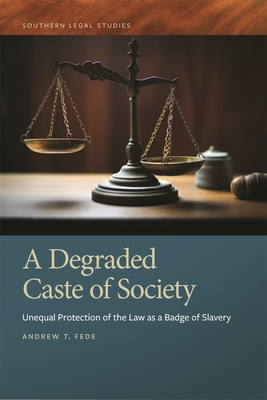A Degraded Caste of Society traces the origins of twenty-first-century cases of interracial violence to the separate and unequal protection principles of the criminal law of enslavement in the southern United States. Andrew T. Fede explains how antebellum appellate court opinions and statutes, when read in a context that includes newspaper articles and trial court and census records, extended this doctrine to the South
Degraded Caste of Society: Unequal Protection of the Law as a Badge of Slavery

Degraded Caste of Society: Unequal Protection of the Law as a Badge of Slavery
A Degraded Caste of Society traces the origins of twenty-first-century cases of interracial violence to the separate and unequal protection principles of the criminal law of enslavement in the southern United States. Andrew T. Fede explains how antebellum appellate court opinions and statutes, when read in a context that includes newspaper articles and trial court and census records, extended this doctrine to the South
PRP: 529.64 Lei
Acesta este Prețul Recomandat de Producător. Prețul de vânzare al produsului este afișat mai jos.
476.68Lei
476.68Lei
529.64 LeiLivrare in 2-4 saptamani
Descrierea produsului
A Degraded Caste of Society traces the origins of twenty-first-century cases of interracial violence to the separate and unequal protection principles of the criminal law of enslavement in the southern United States. Andrew T. Fede explains how antebellum appellate court opinions and statutes, when read in a context that includes newspaper articles and trial court and census records, extended this doctrine to the South
Detaliile produsului













